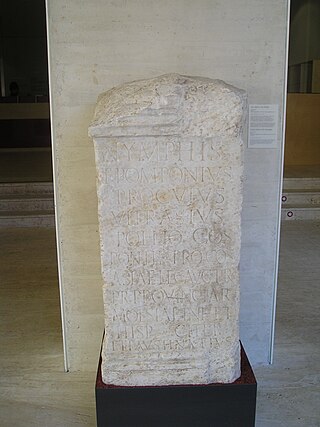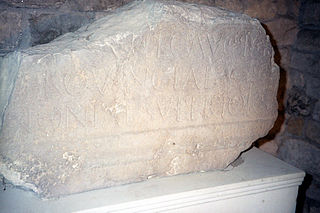Related Research Articles

Titus Pomponius Proculus Vitrasius Pollio was a Roman senator, who held several imperial appointments during the reign of Marcus Aurelius. He was suffect consul in an undetermined nundinium around 151; he was a consul ordinarius in the year 176 with Marcus Flavius Aper as his colleague.
Gaius Curtius Justus was a Roman senator who held several posts in the emperor's service during the Antonine dynasty. He was suffect consul in 150 with Gaius Julius Julianus as his colleague. Justus is known primarily through surviving inscriptions, although he could be identical with the Curtius Justus mentioned as a scriptor rei rusticae by Gargilius Martialis (2.1.4,7).
Lucius Dasumius Tullius Tuscus was a Roman senator who was an amici or trusted advisor of the emperors Antoninus Pius and Marcus Aurelius. He was suffect consul in the nundinium of April to June 152 AD as the colleague of Publius Sufenas.
Titus Prifernius Paetus Rosianus Geminus was a Roman senator of the second century who held a series of posts in the emperor's service. He was suffect consul for the nundinium of May–June AD 146 as the colleague of Publius Mummius Sisenna Rutilianus.
Marcus Pontius Laelianus Larcius Sabinus was a Roman senator and general who held a series of offices in the emperor's service. He was suffect consul for the nundinium of July-August 145 as the colleague of Quintus Mustius Priscus. Laelianus is primarily known through inscriptions.
Quintus Fuficius Cornutus was a Roman senator active in the first half of the second century AD, who held a number of offices in the emperor's service. He was suffect consul for the nundinium April-June AD 147 with Aulus Claudius Charax as his colleague. Cornutus is known only from inscriptions.
Quintus Camurius Numisius Junior was a Roman senator active during the later second century AD. He was suffect consul for a nundinium in the first half of the year 161 as the colleague of Marcus Annius Libo.

Marcus Iallius or Jallius Bassus was a Roman senator, general, and literary figure who held several offices in the imperial service during the mid-second century AD. He was suffect consul around the year 159. Bassus is known primarily from inscriptions. His full name was Marcus Iallius Bassus Fabius Valerianus.
Quintus Licinius Modestinus [? Sextus] Attius Labeo was a Roman senator, who held a number of imperial appointments during the middle of the second century AD. He was suffect consul in the year 146, following the death of Sextus Erucius Clarus in March, serving until the end of June; his colleague was Gnaeus Claudius Severus Arabianus. He is known entirely from inscriptions.
Quintus Voconius Saxa Fidus was a Roman senator, who was active during middle of the second century. He was suffect consul in the nundinium September-October 146 with Gaius Annianus Verus as his colleague. He is known almost entirely from inscriptions; Voconius is mentioned once in Ulpian's Liber octavus de officio proconsulis.
Quintus Cornelius Proculus was a Roman senator, who was active during the middle of the second century AD. He was suffect consul in the nundinium of November–December 146 as the colleague of Lucius Aemilius Longus. Proculus is known entirely from inscriptions.
Lucius Coelius Festus was a Roman senator, who was appointed to several praetorian offices during the reign of Antoninus Pius. He was suffect consul in the nundinium of July-September 148 with Publius Orfidius Senecio as his colleague. Mireille Corbier describes his known career as that of an administrator occupying a modest spot in the Senate. Festus is known entirely from inscriptions.
Lucius Sergius Paullus was a Roman senator, who was active during the reign of Marcus Aurelius. He was twice consul: the first time attested 23 September of an unknown year as suffect consul with [? Lucius Nonius Calpurnius] Torquatus Asprenas as his colleague; and as consul ordinarius for 168 as the colleague of Lucius Venuleius Apronianus Octavius Priscus.

Titus Caesernius Statianus was a Roman senator who held a number of appointments in the Imperial service during the reigns of Hadrian and Antoninus Pius. He was suffect consul in the nundinium of September-October 141; his colleague's name is not known. His full name is Titus Caesernius Statius Quinctius Statianus Memmius Macrinus.
Titus Caesernius Quinctianus was a Roman senator who held a number of appointments in the Imperial service during the reigns of Hadrian and Antoninus Pius. He was suffect consul in an undetermined nundinium around the year 138. His full name was Titus Caesernius Statius Quinctius Macedo Quinctianus.
Quintus Caecilius Marcellus Dentilianus was a Roman senator, who held several imperial appointments during the reign of Antoninus Pius. He was suffect consul in an undetermined nundinium around AD 150. He is known entirely from inscriptions.
Publius Cluvius Maximus Paullinus was a Roman senator, who held a number of imperial appointments during the reigns of Hadrian and Antoninus Pius. He was suffect consul during an undetermined nundinium between 139 and 143. He is known entirely from inscriptions.

Marcus Macrinius Avitus Catonius Vindex was a Roman senator who was active during the reign of Marcus Aurelius. Originally a member of the equestrian order, Vindex demonstrated courage and intelligence that led to his award of dona militaria and elevation into the Senate, followed by his appointment to the consulate, which Géza Alföldy dates to an undetermined nundinium around the year 175.
Marcus Servilius Fabianus Maximus was a Roman senator, who was active during the reigns of Antoninus Pius and Marcus Aurelius. He was suffect consul in a nundinium in mid-158 with Quintus Jallius Bassus as his colleague. A native of North Africa, Maximus was the younger brother of Marcus Servilius Silanus, suffect consul in 152, and a relative of Quintus Servilius Pudens, brother-in-law of emperor Lucius Verus.
Marcus Cominius Secundus was a Roman senator, who was active during the reign of Marcus Aurelius. He was suffect consul in one of the later nundinia of 151 with Lucius Attidius Cornelianus as his colleague. He is known from inscriptions and military diplomas issued during his time.
References
- ↑ Werner Eck, "Die Fasti consulares der Regierungszeit des Antoninus Pius, eine Bestandsaufnahme seit Géza Alföldys Konsulat und Senatorenstand" in Studia epigraphica in memoriam Géza Alföldy, hg. W. Eck, B. Feher, and P. Kovács (Bonn, 2013), p. 82
- ↑ Olli Salomies, Adoptive and Polyonymous Nomenclature in the Roman Empire (Helsinki: Societas Scientiarum Fennica, 1992), p. 142
- ↑ IGRR I.622
- ↑ Alföldy, Konsulat und Senatorenstand unter den Antoninen (Bonn: Habelt Verlag, 1977), p. 296
- ↑ Alföldy, Konsulat und Senatorenstand, p. 255
- ↑ Alföldy, Konsulat und Senatorenstand, p. 290
- ↑ Alföldy, Konsulat und Senatorenstand, p. 231